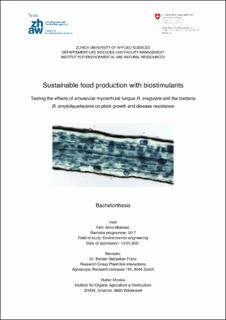Please use this identifier to cite or link to this item:
https://doi.org/10.21256/zhaw-22876Full metadata record
| DC Field | Value | Language |
|---|---|---|
| dc.contributor.advisor | Bender, Sebastian Franz | - |
| dc.contributor.advisor | Hutter, Monika | - |
| dc.contributor.author | Fehr, Anne-Miamed | - |
| dc.date.accessioned | 2021-07-28T10:04:06Z | - |
| dc.date.available | 2021-07-28T10:04:06Z | - |
| dc.date.issued | 2021 | - |
| dc.identifier.uri | https://digitalcollection.zhaw.ch/handle/11475/22876 | - |
| dc.description.abstract | The soil beneath our feet holds a complex network of microorganisms that influence each other as well as the plants that grow in the soil. Promoting these soil communities offers new opportunities to create sustainable agricultural systems. Through their fungal network arbuscular mycorrhizal fungi (AMF) provide additional nutrients from the soil to plants. Hence, they represent a natural soil nutrient resource with the potential to reduce external fertilizer inputs in the future. The AMF Rhizoglomus irregulare and the bacterium Bacillus amyloliquefaciens are two biostimulants that associate with roots of many important agricultural crops. In this study three field trials were carried out with the crops celery, celery root and root parsley, on three vegetable farms with organic and demeter management. The effect of the two biostimulants R. irregulare and B. amyloliquefaciens inoculated alone or in combination, on yield performance and disease suppression was evaluated by measuring the plant weight, colonization rate by the inoculated fungus in plant roots, plant nutrient concentrations and disease infection rates. A positive effect of the inoculation with R. irregulare on plant growth was found in root parsley with a significant yield increase of 31 %. In celery and root parsley both inoculated and control plants showed high colonization levels, indicating that in these soils the occurrence of native AMF was already high. The crop celery root showed a significant increase in arbuscular root colonization. No significant positive effects of B. amyloliquefaciens on plant growth, as well as of both biostimulants on disease suppression were found. The yield increase by R. irregulare inoculation in root parsley was not reflected in a higher colonization rate by AMF in the roots. However, analysis of the nutrient concentrations of the experimental plants shows, that inoculated plants presented significantly higher uptakes of N, P, C, Mg and Ca. It is assumed that the inoculated AM-fungus has replaced the native AM-fungi in the root. In the future, molecular methods present promising tools to investigate the arbuscular mycorrhizal root colonization at species level and therefore, to better understand the influence of inoculated AM- fungi. | de_CH |
| dc.format.extent | 31 | de_CH |
| dc.language.iso | en | de_CH |
| dc.publisher | ZHAW Zürcher Hochschule für Angewandte Wissenschaften | de_CH |
| dc.rights | https://creativecommons.org/licenses/by/4.0/ | de_CH |
| dc.subject | Arbuscular mycorrhizal fungus | de_CH |
| dc.subject | AMF | de_CH |
| dc.subject | Bacillus amyloliquefaciens | de_CH |
| dc.subject | Biostimulants | de_CH |
| dc.subject | MHB | de_CH |
| dc.subject | Rhizoglomus irregulare | de_CH |
| dc.subject.ddc | 579: Mikrobiologie | de_CH |
| dc.subject.ddc | 635: Gartenpflanzen (Gartenbau) | de_CH |
| dc.title | Sustainable food production with biostimulants : testing the effects of arbuscular mycorrhizal fungus R. irregulare and the bacteria B. amyloliquefaciens on plant growth and disease resistance | de_CH |
| dc.type | Thesis: Bachelor | de_CH |
| dcterms.type | Text | de_CH |
| zhaw.departement | Life Sciences und Facility Management | de_CH |
| zhaw.publisher.place | Winterthur | de_CH |
| dc.identifier.doi | 10.21256/zhaw-22876 | - |
| zhaw.originated.zhaw | Yes | de_CH |
| Appears in collections: | Bachelorarbeiten Umweltingenieurwesen | |
Files in This Item:
| File | Description | Size | Format | |
|---|---|---|---|---|
| 2021_Fehr_Anne_Miamed_BA_UI.pdf | 9.23 MB | Adobe PDF |  View/Open |
Show simple item record
Fehr, A.-M. (2021). Sustainable food production with biostimulants : testing the effects of arbuscular mycorrhizal fungus R. irregulare and the bacteria B. amyloliquefaciens on plant growth and disease resistance [Bachelor’s thesis, ZHAW Zürcher Hochschule für Angewandte Wissenschaften]. https://doi.org/10.21256/zhaw-22876
Fehr, A.-M. (2021) Sustainable food production with biostimulants : testing the effects of arbuscular mycorrhizal fungus R. irregulare and the bacteria B. amyloliquefaciens on plant growth and disease resistance. Bachelor’s thesis. ZHAW Zürcher Hochschule für Angewandte Wissenschaften. Available at: https://doi.org/10.21256/zhaw-22876.
A.-M. Fehr, “Sustainable food production with biostimulants : testing the effects of arbuscular mycorrhizal fungus R. irregulare and the bacteria B. amyloliquefaciens on plant growth and disease resistance,” Bachelor’s thesis, ZHAW Zürcher Hochschule für Angewandte Wissenschaften, Winterthur, 2021. doi: 10.21256/zhaw-22876.
FEHR, Anne-Miamed, 2021. Sustainable food production with biostimulants : testing the effects of arbuscular mycorrhizal fungus R. irregulare and the bacteria B. amyloliquefaciens on plant growth and disease resistance. Bachelor’s thesis. Winterthur: ZHAW Zürcher Hochschule für Angewandte Wissenschaften
Fehr, Anne-Miamed. 2021. “Sustainable Food Production with Biostimulants : Testing the Effects of Arbuscular Mycorrhizal Fungus R. Irregulare and the Bacteria B. Amyloliquefaciens on Plant Growth and Disease Resistance.” Bachelor’s thesis, Winterthur: ZHAW Zürcher Hochschule für Angewandte Wissenschaften. https://doi.org/10.21256/zhaw-22876.
Fehr, Anne-Miamed. Sustainable Food Production with Biostimulants : Testing the Effects of Arbuscular Mycorrhizal Fungus R. Irregulare and the Bacteria B. Amyloliquefaciens on Plant Growth and Disease Resistance. ZHAW Zürcher Hochschule für Angewandte Wissenschaften, 2021, https://doi.org/10.21256/zhaw-22876.
Items in DSpace are protected by copyright, with all rights reserved, unless otherwise indicated.